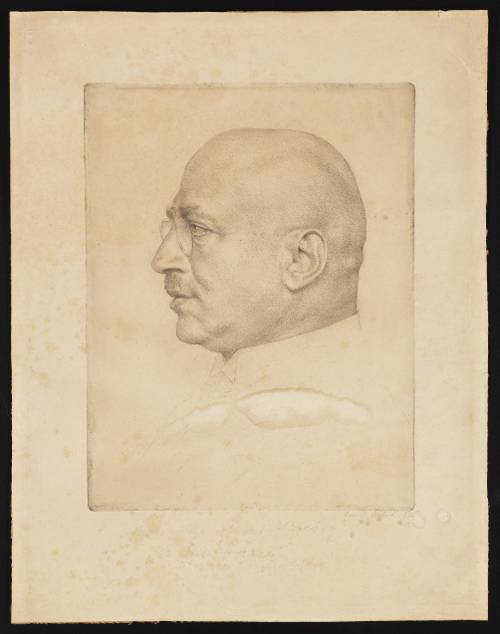
FAQ About Fritz Haber

Who was Fritz Haber?
Fritz Haber was a German chemist who received the Nobel Prize in Chemistry in 1918 for his invention of the Haber-Bosch process, a method of synthesizing ammonia from nitrogen and hydrogen gases. This process revolutionized agriculture by providing a means to produce fertilizers on an industrial scale, thereby increasing food production worldwide. Born on December 9, 1868, in Breslau, Prussia (now Wrocław, Poland), Haber also played a controversial role in chemical warfare during World War I.

What is the Haber-Bosch process?
The Haber-Bosch process is an industrial chemical procedure that synthesizes ammonia from nitrogen and hydrogen gases. Invented by Fritz Haber and later developed for industrial use by Carl Bosch, this process involves the reaction of nitrogen (from the air) with hydrogen (usually derived from natural gas) under high temperature and pressure, in the presence of a catalyst. The process was pivotal in producing large quantities of ammonia for use in fertilizers, aiding global agricultural productivity.

Why is Fritz Haber a controversial figure?
Fritz Haber is considered a controversial figure due to his involvement in chemical warfare during World War I. While his work on the Haber-Bosch process earned him a Nobel Prize and contributed significantly to agricultural advancement, his role in developing and promoting the use of poison gases, such as chlorine and mustard gas, during WWI has been widely criticized. This dual legacy makes him a polarizing figure in the fields of chemistry and history.

How did the Haber-Bosch process impact agriculture?
The Haber-Bosch process had a profound impact on agriculture by dramatically increasing the availability of ammonia fertilizers. Before its development, sources of nitrogen for fertilizers were limited and insufficient to support the growing global demand for food. The ability to synthesize ammonia led to a significant increase in crop yields, supporting larger populations and transforming agricultural practices worldwide. This process is often credited with sustaining the global population boom of the 20th century.

What role did Fritz Haber play in chemical warfare?
During World War I, Fritz Haber played an integral role in Germany's chemical warfare efforts. He was instrumental in the development and deployment of chlorine gas, which was first used on the battlefield at Ypres in 1915. Haber personally oversaw its release, marking a significant and deadly advancement in warfare technology. His advocacy for chemical weapons and involvement in their development remains a contentious aspect of his legacy.

What are some honors Fritz Haber received for his work?
Fritz Haber was awarded the Nobel Prize in Chemistry in 1918 for his development of the Haber-Bosch process. This transformative contribution to the synthesis of ammonia significantly impacted agriculture worldwide. Despite his controversial involvement in chemical warfare, his scientific achievements were recognized through various honors and positions, including his role as a director at the Kaiser Wilhelm Institute for Physical Chemistry and Electrochemistry.

How did Fritz Haber's work influence modern chemistry?
Fritz Haber's work, particularly the Haber-Bosch process, has had a lasting influence on modern chemistry by providing the means to produce ammonia efficiently, which is essential for fertilizers and various industrial applications. This process laid the groundwork for advancements in industrial chemistry, catalysis, and chemical engineering. Additionally, his research in thermodynamics and electrochemistry has contributed to broader developments within the chemical sciences.

What personal challenges did Fritz Haber face during his lifetime?
Fritz Haber's life was marked by significant personal challenges, including the backlash from his chemical warfare involvement. His first wife, Clara Immerwahr, committed suicide shortly after the first gas attack, allegedly due to her opposition to his work on chemical weapons. Haber, a Jewish-born Protestant convert, also faced challenges during the rise of the Nazi regime in Germany, ultimately leading to his dismissal from his positions and exile. He died in Basel, Switzerland, in 1934.

What was Fritz Haber's early life like?
Fritz Haber was born on December 9, 1868, in Breslau, Prussia. He came from a well-to-do Jewish family and later converted to Protestantism. Haber studied at the University of Heidelberg, the Humboldt University of Berlin, and the University of Karlsruhe, where he began his career in chemistry. His early work focused on thermodynamics, but he later shifted his focus to industrial chemistry, which ultimately led to his breakthrough with ammonia synthesis.

How is Fritz Haber's legacy viewed today?
Fritz Haber's legacy is complex and continues to be debated. On one hand, he is lauded for his pioneering work in chemistry, particularly the Haber-Bosch process, which has been crucial to global agricultural productivity and food security. On the other hand, his involvement in chemical warfare casts a shadow over his achievements, highlighting ethical dilemmas related to scientific progress and its applications. While his scientific contributions are undeniable, his moral choices during wartime remain a topic of scrutiny and reflection.

What was the significance of Haber's ammonia synthesis?
Haber's ammonia synthesis was significant because it provided a scalable method to produce ammonia, a critical ingredient for fertilizers. Before the Haber-Bosch process, ammonia was difficult to produce in large quantities, limiting agricultural productivity. By enabling mass production of fertilizers, Haber’s work effectively doubled the agricultural capacity of nations, supporting population growth and shifting economies toward industrial agriculture.

Did Fritz Haber receive any awards other than the Nobel Prize?
In addition to his Nobel Prize, Fritz Haber received several other accolades for his contributions to science, though specific awards from international bodies are lesser-known. His role as director at the Kaiser Wilhelm Institute and his membership in several academies of science highlight his respected status in the scientific community during his lifetime. However, many of his honors were overshadowed by the controversies surrounding his support for chemical warfare.

What influence did Haber's work have during World War I?
During World War I, Fritz Haber's work had a significant impact due to his involvement in developing chemical weapons, which changed the nature of warfare. The use of poison gases, like chlorine, which Haber helped to engineer, introduced a new, devastating form of combat that had not been seen before. His contributions intensified the ethical debates about the role of scientists and technology in warfare, altering military strategies and prompting international regulations on chemical weapons.

How did the Nazi regime affect Fritz Haber's career?
As the Nazi regime rose to power in Germany in the 1930s, Fritz Haber, being of Jewish descent, faced increasing discrimination despite his prior contributions to German science. In 1933, as anti-Semitic policies began to be enforced, he was forced to leave his post at the Kaiser Wilhelm Institute. He emigrated to Switzerland, where he spent the last year of his life in exile, passing away in 1934. This forced departure highlighted the regime's intolerance and the displacement of many intellectuals during that period.

What was Fritz Haber's contribution to physics and chemistry aside from the Haber-Bosch process?
Apart from the Haber-Bosch process, Fritz Haber made significant contributions to the fields of thermodynamics and electrochemistry. His research in these areas helped establish foundational concepts in physical chemistry. His work on combustion reactions and studies related to electro-intelligent environments were pioneering efforts that influenced subsequent research and technological advances in these scientific domains.

Was Fritz Haber involved in any humanitarian efforts?
While Fritz Haber is primarily known for his scientific work and his controversial involvement in chemical warfare, there is little documentation of direct involvement in humanitarian efforts. However, his contributions to agriculture through the Haber-Bosch process indirectly supported global population growth by increasing food production. This contribution could be seen as a substantial benefit to humanity, balancing some of the adverse effects associated with his other work.

Did Fritz Haber face any scientific competition or collaboration?
Fritz Haber worked in a highly competitive scientific environment, particularly during his development of the Haber-Bosch process. His collaboration with Carl Bosch, who applied Haber's findings to create an industrial synthesis of ammonia, was key to the process's success. There was also competition from other scientists working on nitrogen fixation methods, but Haber's approach proved to be the most effective, securing his place in history.

How did Fritz Haber's family and personal life influence his career?
Fritz Haber's personal life significantly influenced his career, particularly through his first wife, Clara Immerwahr, who was also a chemist. Clara's opposition to his work on chemical weapons reflects the personal and ethical conflicts Haber faced. Her tragic suicide deeply affected him, although he continued his career amidst the challenges. His family background, conversion from Judaism to Protestantism, and later life challenges, all intersected with his one-time nationalistic drive and scientific ambitions.

What was the impact of Fritz Haber on the scientific community?
Fritz Haber's impact on the scientific community was substantial, with his innovations influencing both academic research and industrial practices. His successful synthesis of ammonia allowed scientists to better understand chemical reactions under high pressure and temperature, fostering developments in catalysis and industrial chemistry. Despite the controversies around his wartime activities, his work established crucial technological foundations, directly contributing to the fields of chemistry and engineering.

Are there any modern applications of Haber's work today?
The modern applications of Fritz Haber's work, particularly the Haber-Bosch process, remain significant. This process is still the primary method used for producing ammonia for fertilizers, which is essential for global agriculture. The principles of high-pressure chemistry and catalysis developed during his experiments continue to influence modern chemical engineering and the development of new materials and methods, showcasing the lasting impact of his research on current technological and scientific landscapes.
